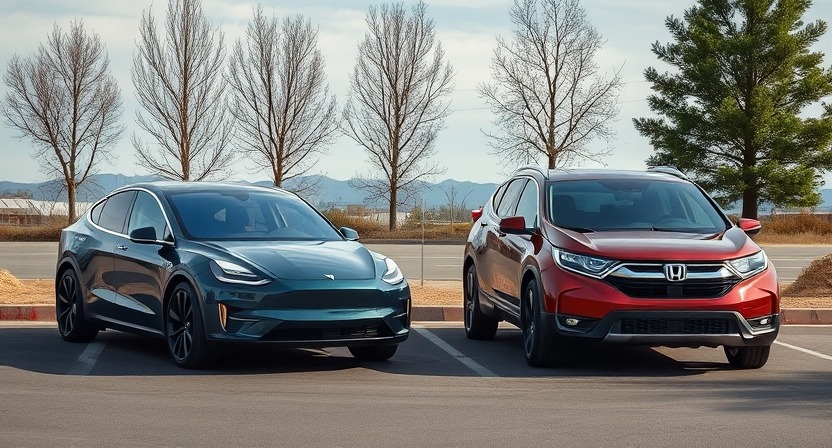In today’s rapidly changing world, choosing the right vehicle can feel overwhelming. With electric vehicles (EVs) and hybrids dominating the market, it’s important to understand how these options fit into your lifestyle. Let’s break down what each offers and how to decide what’s best for you.
What Are EVs and Hybrids?
- Electric Vehicles (EVs):
EVs run entirely on electricity, using a rechargeable battery to power the car. They have no traditional engine, meaning no gasoline is required. Popular examples include Tesla models, the Nissan Leaf, and the BYD Dolphin. - Hybrid Vehicles:
Hybrids use both a gasoline engine and an electric motor, working together for improved efficiency. The car can switch between the two power sources or use them together for efficiency. Examples include the Toyota Prius and Honda CR-V Hybrid.
Key Differences Between EVs and Hybrids
- Power Source:
- EVs: 100% electric.
- Hybrids: A mix of gasoline and electric power.
- Emissions:
- EVs: Zero emissions, making them the cleaner option.
- Hybrids: Lower emissions than traditional cars but still emit some pollutants.
- Cost:
- EVs: Often more expensive upfront but cheaper to maintain.
- Hybrids: Usually more affordable initially but may cost more over time due to fuel and maintenance.
- Range and Refueling:
- EVs: Depend on battery range and require charging stations.
- Hybrids: Use gas stations and don’t rely solely on charging.
Who Should Choose an EV?
1. If You’re Environmentally Conscious
EVs are a great option if you want to reduce your carbon footprint. Since they produce no emissions, they contribute significantly to cleaner air and reduced greenhouse gases.
2. When Charging Is Convenient
Owning an EV is convenient if you have a charging station at home or nearby. Overnight charging can be as simple as plugging in your phone.
3. If You Drive Locally
EVs excel in urban areas where you can frequently recharge. If your daily commute is under 100 kilometers, range anxiety won’t be an issue.
Who Should Choose a Hybrid?
1. If You Drive Long Distances
Hybrids offer the flexibility of using gasoline for longer trips. You don’t have to worry about running out of battery in remote areas.
2. If You Want Affordability
Hybrids are generally less expensive than EVs, making them an accessible option for those on a tighter budget.
3. If Charging Isn’t Convenient
Without reliable access to charging stations, hybrids are a practical choice. They refuel at any gas station, offering unmatched convenience.
Costs: Breaking Down Your Budget
Initial Purchase Price
- EVs: Higher upfront cost due to advanced batteries and technology.
- Hybrids: More affordable for buyers transitioning from traditional cars.
Running Costs
- EVs: Lower running costs since electricity is cheaper than gasoline. Maintenance is minimal because there’s no engine to service.
- Hybrids: Regular fuel expenses add up, and engine maintenance is still required.
Incentives and Subsidies
Many governments offer financial incentives for EV buyers, such as tax rebates or discounts. These incentives often make EVs more appealing despite their higher price.
Performance: How Do They Compare on the Road?
EVs: Silent and Powerful
EVs are whisper-quiet and offer instant acceleration. If you enjoy a smooth, futuristic driving experience, they deliver in spades.
Hybrids: Balanced and Reliable
Hybrids provide a familiar driving experience with the added efficiency of electric support. They’re a safe choice for drivers hesitant to fully embrace EV technology.
Environmental Impact: Making a Difference
EVs Lead the Way
With zero emissions, EVs are the gold standard for eco-friendly driving. However, their batteries require significant resources to produce, raising concerns about mining and recycling.
Hybrids: A Step Forward
Hybrids reduce emissions compared to traditional cars but still rely on fossil fuels. They’re a good middle ground for those looking to minimize environmental impact without going all-electric.
Future-Proofing: Which Is More Sustainable?
EVs Are the Future
As governments push for greener solutions, EV infrastructure continues to grow. Many countries plan to phase out gasoline-powered cars entirely in the coming decades.
Hybrids as a Transition
Hybrids serve as a bridge between gas-powered cars and EVs. However, as EV technology advances, hybrids may become less relevant.
Making the Right Choice for You
When deciding between an EV and a hybrid, consider these factors:
- Your Budget: Can you afford the upfront cost of an EV, or is a hybrid more practical?
- Your Driving Habits: Do you drive locally or frequently take long trips?
- Charging Access: Is a charging station easily available to you?
- Environmental Goals: How important is reducing your carbon footprint?
Conclusion: The Final Verdict
Both EVs and hybrids offer unique advantages, and the right choice depends on your lifestyle. If you prioritize sustainability and short-range convenience, an EV might be your best bet. On the other hand, if you value flexibility and affordability, a hybrid could suit you better.
The good news is that both options move us closer to a cleaner, greener future. So, whether you go electric or hybrid, you’re contributing to positive change on the road.







